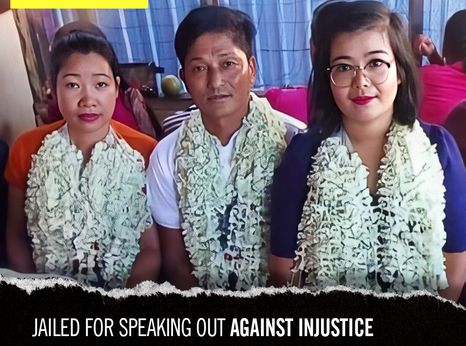Release supporters of child soldier

On 17 January 2018, about 15 people, including Nay Zar Tun, Khin Cho Naing and Myint Zaw, staged a peaceful protest outside the Dagon Seikkan Township Court building in Yangon, Myanmar’s main city. The protest followed a judge’s decision to charge former child soldier Aung Ko Htwe under Section 505(b) of Myanmar’s Penal Code for a media interview in which he talked about being abducted and forcibly recruited in to the Myanmar military when he was a child. Some protesters allegedly called the judge a “cow without conscience” and stepped on a photocopy of Myanmar's Constitution.
On 18 January 2018, police arrested two people – Lay Lay and Naung Naung – accusing them of leading the protest. Both were charged under Sections 505(b) and 153 of Myanmar Penal Code, and they were each subsequently sentenced to 18 months in prison. They have both been released after completing their sentences. Three other accused activists fled in to hiding.
More than a year after the protest, Myint Zaw was arrested on 7 May 2019 while waiting outside Insein prison to see if Aung Ko Htwe was released in the mass prisoner amnesty announced by the President. Khin Cho Naing and Nay Zar Tun turned themselves in on 4 and 19 June 2019 respectively, and were subsequently taken to Insein prison.
On 24 December 2019, Nay Zar Naing, Khin Cho Naing and Myint Zaw were convicted and sentenced to one year in prison under Section 505(b) and to six months in prison under Section 153 of the Penal Code, to be served concurrently. Khin Cho Naing and Myint Zaw were convicted of a further charge under Section 7 of the Union Seal Law and sentenced to an additional six months in prison.
Aung Ko Htwe was arrested on 18 August 2017 shortly after he gave a media interview about how the Myanmar military abducted and forcibly recruited him when he was 13 years old. He was sentenced to two years in prison under Section 505 (b) of Myanmar’s Penal Code. He was also convicted for “intentional insult of a public servant sitting at any stage of a judicial proceeding” under Section 228 of the Penal Code after criticizing the judge presiding over his trial and sentenced to an additional six months in prison. He was released from prison a few months early on 6 September 2019.
Section 505(b) of Myanmar’s Penal Code is a vaguely worded provision that targets any person who makes, publishes or circulates information which may cause “fear or alarm to the public or to any section of the public whereby any person may be induced to commit an offence against the State or against the public tranquillity”. It carries a maximum sentence of two years in prison. The offence under Section 153 of the Penal Code targets “whoever malignantly, or wantonly, by doing anything which is illegal, gives provocation to any person intending or knowing if to be likely that such provocation will cause the offence of rioting to be committed,” and carries a maximum prison sentence of one year. Section 7 of the Union Seal Law provides up to three years in prison for anyone “causing destruction of the whole or any part of the Union Seal”.
Amnesty International is concerned about the ongoing arrest and detention of activists and human rights defenders in Myanmar for peacefully exercising their right to freedom of expression, a right enshrined in Article 19 of the Universal Declaration of Human Rights (UDHR). The Myanmar authorities must ensure respect for, and protection of, this and other human rights, in particular as the country prepares to head to the polls in elections in November 2020.